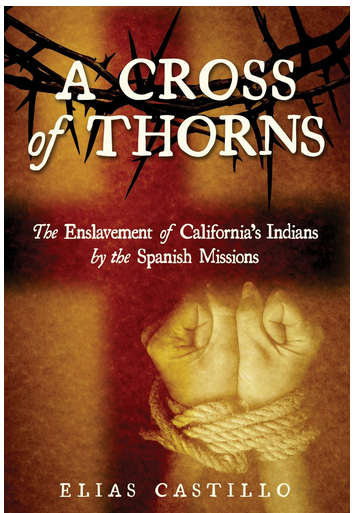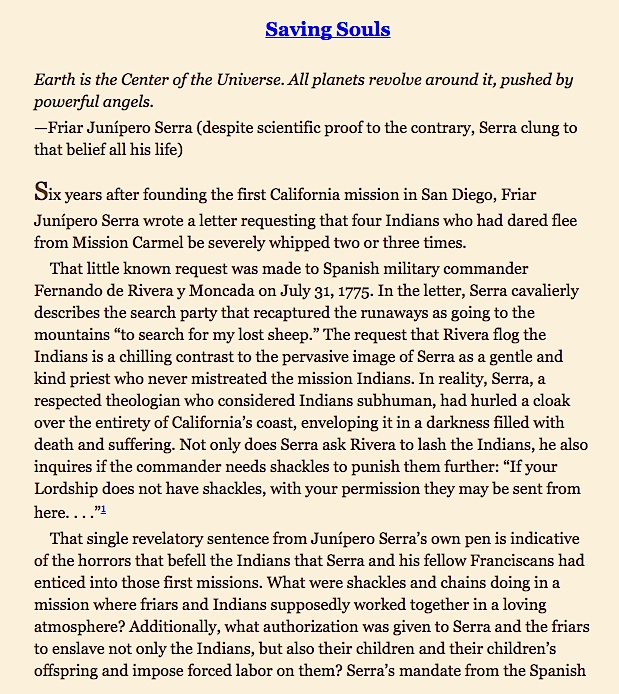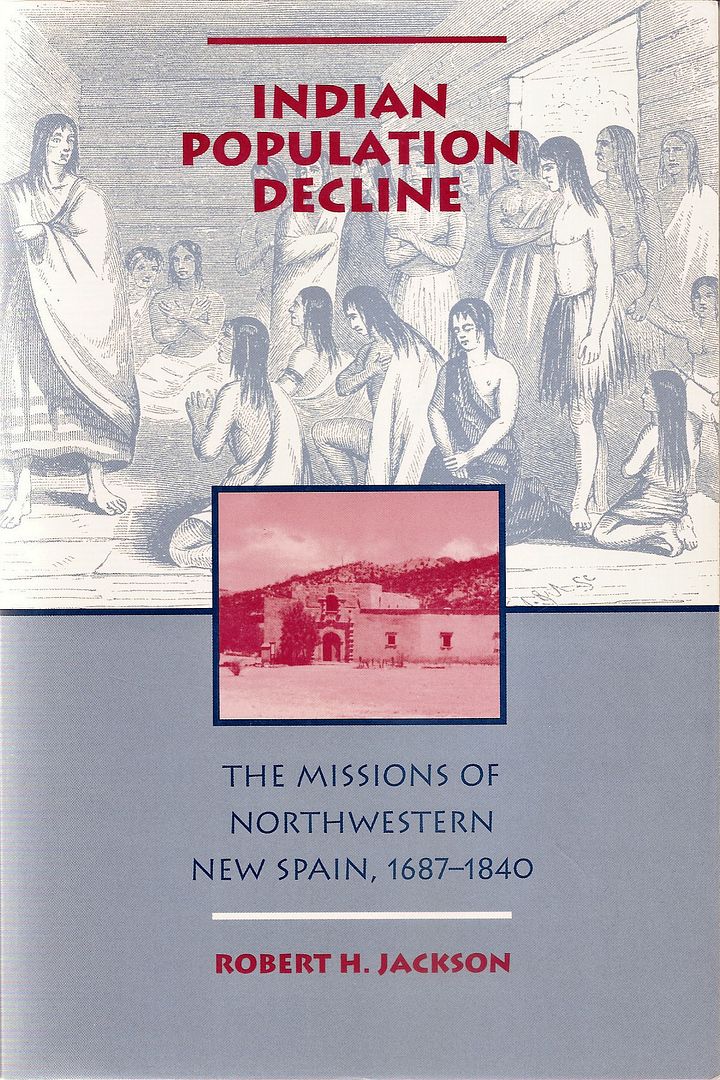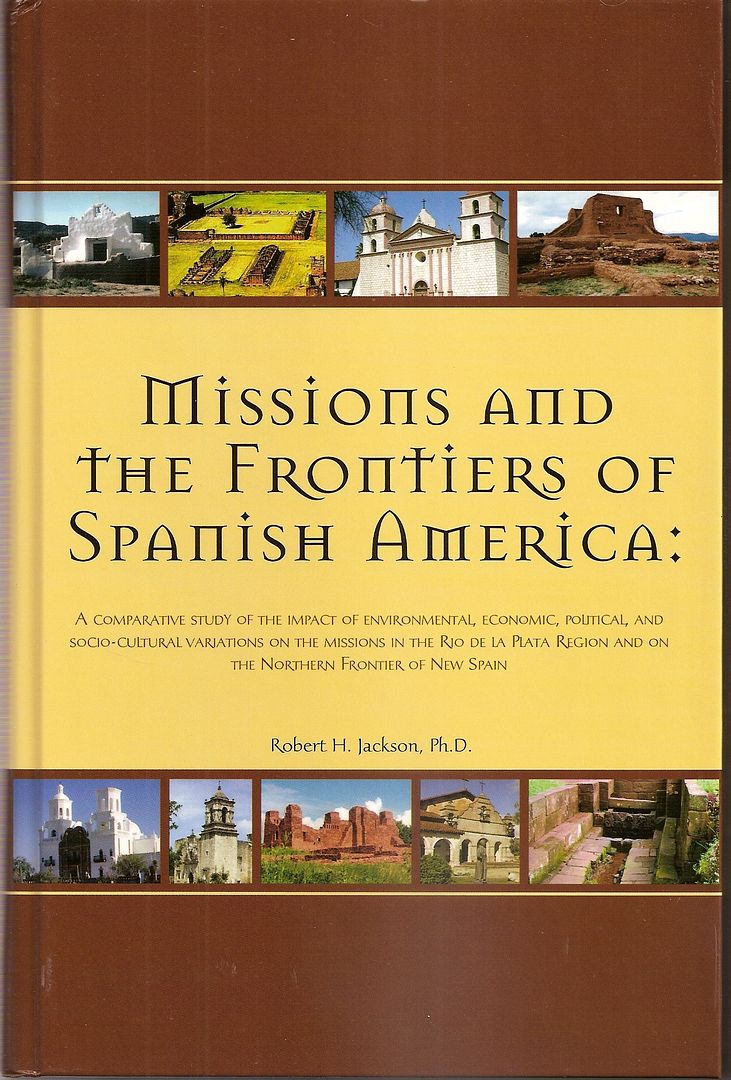| Pages:
1
2
3
4 |
güéribo
Nomad
 
Posts: 239
Registered: 10-17-2014
Member Is Offline
|
|
new book on California missions
Published in February 2015
A Cross of Thorns: The Enslavement of California's Indians by the Spanish Missions - by Elias Castillo
About the Author
Elias Castillo is a three-time Pulitzer Prize nominee and the winner of thirteen journalism awards. Born in Mexicali, Baja California, Castillo holds
two degrees from San Jose State University and is a former reporter for the San Jose Mercury News and the Associated Press.

|
|
|
David K
Honored Nomad
        
Posts: 65453
Registered: 8-30-2002
Location: San Diego County
Member Is Offline
Mood: Have Baja Fever
|
|
Thank you for the news of a new history book. It will be interesting to see if the title is designed to create sales. Some and not all Indians, and
some not all missions this happened. Also, not until the arrival of the Franciscans and Dominicans who replaced the removed Jesuits by the government
of Spain.
|
|
|
4x4abc
Ultra Nomad
    
Posts: 4455
Registered: 4-24-2009
Location: La Paz, BCS
Member Is Offline
Mood: happy - always
|
|
I want one of yours, David! Can you bring one? With your autograph, of course.
Harald Pietschmann
|
|
|
David K
Honored Nomad
        
Posts: 65453
Registered: 8-30-2002
Location: San Diego County
Member Is Offline
Mood: Have Baja Fever
|
|
I have 10 copies I will be bringing south... thank you for your interest.
güeríbo (nice to get your original name back): Please let us know if you are reading the Cross of Thorns book. I would like to know if it is about all
the California Indians and missions or just those from San Diego north.
|
|
|
güéribo
Nomad
 
Posts: 239
Registered: 10-17-2014
Member Is Offline
|
|
Hi, David. Thanks for the comment. I don't sense that the title is used solely as a hook for sales. I do believe the author is writing from his
core belief, which arose through his research and dialogue with native groups. I first heard the book referenced in an open letter to the Pope, from
the Amah Mutsun Tribal Band of Costanoan/Ohlone Indians. (The letter is about the proposed canonization of Serra). It's a heartfelt perspective.
Here is a link to the letter, for those interested in the controversy surrounding Serra and sainthood:
https://www.indybay.org/newsitems/2015/03/02/18769396.php
|
|
|
bajajudy
Elite Nomad
     
Posts: 6886
Registered: 10-4-2004
Location: San Jose del Cabo,BCS
Member Is Offline
|
|
Quote: Originally posted by güéribo  | Hi, David. Thanks for the comment. I don't sense that the title is used solely as a hook for sales. I do believe the author is writing from his
core belief, which arose through his research and dialogue with native groups. I first heard the book referenced in an open letter to the Pope, from
the Amah Mutsun Tribal Band of Costanoan/Ohlone Indians. (The letter is about the proposed canonization of Serra). It's a heartfelt perspective.
Here is a link to the letter, for those interested in the controversy surrounding Serra and sainthood:
https://www.indybay.org/newsitems/2015/03/02/18769396.php |
Whoa. That was an eye opening article...thank you for that information
[Edited on 3-28-2015 by bajajudy]
[Edited on 3-28-2015 by BajaNomad]
|
|
|
4x4abc
Ultra Nomad
    
Posts: 4455
Registered: 4-24-2009
Location: La Paz, BCS
Member Is Offline
Mood: happy - always
|
|
it's about Serra and the Franciscans - San Diego and north

Harald Pietschmann
|
|
|
TMW
Select Nomad
      
Posts: 10659
Registered: 9-1-2003
Location: Bakersfield, CA
Member Is Offline
|
|
I can understand and feel for those treated badly by the padres and the whiteman later but really now are the affects from a hundred years ago
affecting the tribe members today. I find that hard to believe.
From the letter to the pope:
["I also discussed how our current Tribal members continue to suffer from the impact of cumulative emotional and psychological wounding, which is
otherwise known as historic trauma. This trauma resulted from the generations of physical and emotional brutality as well as the attempted cultural
and spiritual genocide of all California native people. Our ancestors endured this brutality not only during mission times but this legacy continued
during the Mexican and American periods. Historic trauma also results from the fact that from mission times to the present our legitimate past and our
humanity as indigenous people have never been truly acknowledged by any governmental or religious organization."]
|
|
|
4x4abc
Ultra Nomad
    
Posts: 4455
Registered: 4-24-2009
Location: La Paz, BCS
Member Is Offline
Mood: happy - always
|
|
well if some in our community can claim that they can't hold a job because sometime in the past family members have been forced to work in cotton
fields - then the claim of these native Americans is as valid. Or an excuse. For whatever.
Harald Pietschmann
|
|
|
mtgoat666
Platinum Nomad
       
Posts: 20683
Registered: 9-16-2006
Location: San Diego
Member Is Offline
Mood: Hot n spicy
|
|
Quote: Originally posted by TMW  | I can understand and feel for those treated badly by the padres and the whiteman later but really now are the affects from a hundred years ago
affecting the tribe members today. I find that hard to believe.
|
Well, we still have a racist majority white rule over ethnic classes, and many living Indians have memory of their forced separation of children and
their parents,... The list goes on,...
The reality is many of you white people like to say you are not bigoted, but you all know many people that are bigoted,.... So is it not too much for
you white majority to admit racism still exists and holds back non-whites?
|
|
|
mtgoat666
Platinum Nomad
       
Posts: 20683
Registered: 9-16-2006
Location: San Diego
Member Is Offline
Mood: Hot n spicy
|
|
The things white people say!

|
|
|
monoloco
Elite Nomad
     
Posts: 6667
Registered: 7-13-2009
Location: Pescadero BCS
Member Is Offline
|
|
Quote: Originally posted by TMW  | I can understand and feel for those treated badly by the padres and the whiteman later but really now are the affects from a hundred years ago
affecting the tribe members today. I find that hard to believe.
From the letter to the pope:
["I also discussed how our current Tribal members continue to suffer from the impact of cumulative emotional and psychological wounding, which is
otherwise known as historic trauma. This trauma resulted from the generations of physical and emotional brutality as well as the attempted cultural
and spiritual genocide of all California native people. Our ancestors endured this brutality not only during mission times but this legacy continued
during the Mexican and American periods. Historic trauma also results from the fact that from mission times to the present our legitimate past and our
humanity as indigenous people have never been truly acknowledged by any governmental or religious organization."]
|
That seems fairly self-explanatory, we see the same thing with the tribes in the US. When a race of people
are systematically displaced, brutalized, and marginalized over a span of centuries, it has a lasting effect on their culture. Ask yourself why else a
once proud people, who had a successful culture that lasted thousands of years, ended up with many of the survivors mired in poverty, alcoholism, and
despair. Their culture was stolen from them and replaced by hundreds of years of servitude and abuse that lasted well into the 20th century, and in
many ways continues to this day. That can take a while to get over.
[Edited on 3-28-2015 by monoloco]
"The future ain't what it used to be"
|
|
|
elbeau
Nomad
 
Posts: 256
Registered: 3-2-2011
Location: Austin, TX
Member Is Offline
|
|
Quote: Originally posted by TMW  | I can understand and feel for those treated badly by the padres and the whiteman later but really now are the affects from a hundred years ago
affecting the tribe members today. I find that hard to believe.
|
I grew up in Utah and we would often drive through Brigham city on our way to Cache valley to visit relatives. The road took us past the large,
recently-abandoned Indian boarding school. The schools would force Native American children to live away from their families and were systematically
taught to abandon their native heritage.
This is not ancient history. It wasn't until 1978 that Native American parents gained the legal right to refuse to send their children to these
boarding schools.
You ask: "are the affects from a hundred years ago affecting the tribe members today? I find that hard to believe."
I don't find that hard to believe. It's not ancient history.
|
|
|
monoloco
Elite Nomad
     
Posts: 6667
Registered: 7-13-2009
Location: Pescadero BCS
Member Is Offline
|
|
Quote: Originally posted by elbeau  | Quote: Originally posted by TMW  | I can understand and feel for those treated badly by the padres and the whiteman later but really now are the affects from a hundred years ago
affecting the tribe members today. I find that hard to believe.
|
I grew up in Utah and we would often drive through Brigham city on our way to Cache valley to visit relatives. The road took us past the large,
recently-abandoned Indian boarding school. The schools would force Native American children to live away from their families and were systematically
taught to abandon their native heritage.
This is not ancient history. It wasn't until 1978 that Native American parents gained the legal right to refuse to send their children to these
boarding schools.
You ask: "are the affects from a hundred years ago affecting the tribe members today? I find that hard to believe."
I don't find that hard to believe. It's not ancient history. |
Exactly, and the racism and stereotyping of
native Americans continues to this day, both in the US and Mexico.
"The future ain't what it used to be"
|
|
|
güéribo
Nomad
 
Posts: 239
Registered: 10-17-2014
Member Is Offline
|
|
Quote: Originally posted by David K  | | Thank you for the news of a new history book. It will be interesting to see if the title is designed to create sales. Some and not all Indians, and
some not all missions this happened. Also, not until the arrival of the Franciscans and Dominicans who replaced the removed Jesuits by the government
of Spain. |
Hello, David. I do appreciate your study and all the resources you share. I've benefited quite a bit from your help and information! But here, I
must respectfully disagree. There are many documented instances of whippings, executions with bodies put on display, campaigns against natives who
resisted (even in response to the rape of women by soldiers), shackles, subjugation . . . under Jesuit rule.
Robert H. Jackson outlines quite a few examples in his book, "From Savages to Subjects." (Chapter 4: Indigenous Resistance and Social Control)
|
|
|
David K
Honored Nomad
        
Posts: 65453
Registered: 8-30-2002
Location: San Diego County
Member Is Offline
Mood: Have Baja Fever
|
|
No worries, I want to be correct... are these documented events by Jesuits in California (Baja)?
Perhaps I don't recall the incidents, but it seems the California project was so special to the Jesuits that they did all they could to learn the
native language, honor their nations, named mission sites with the native name included, and allowed the natives to move about to collect food, etc.
It was what happened after the Jesuits that was like night and day and so devastating to native freedom.
As you may know, Robert Jackson is a Nomad (academicanarchist) and has worked with me on various mission studies, and reviewed the Spanish edition of
our Old Missions book. I have two of his books...


|
|
|
TMW
Select Nomad
      
Posts: 10659
Registered: 9-1-2003
Location: Bakersfield, CA
Member Is Offline
|
|
I don't see how anyone in today's world can not understand that an education is the key to success. The casinos have given the Indian a steady stream
of income even to the point of fighting over control as they are in Fresno. The tribe I quote above has been accused of wanting to be recognized by
the US government so they can build a casino which they is not true. But they want to build a hotel as an income source which in my opinion is the
first step toward a casino.
But then as goat says I'm just an old white racist.
|
|
|
güéribo
Nomad
 
Posts: 239
Registered: 10-17-2014
Member Is Offline
|
|
Hi, again, David! Yes, I remember academic anarchist. A great scholarly researcher.
Physical and emotional strategies of abuse were employed by the Jesuits throughout the Spanish colonial empire to maintain control. Examples
involving the Jesuit punishment of Yaqui on the mainland are described in The Oxford History of Mexico (ed. William Beezley, Michael Meyer), in The
Ópatas: In Search of a Sonoran People (David A. Yetman), and several examples in Baja are outlined in the Jackson book mentioned above.
Yetman writes: "Jesuit rules and regulations of 1662 had cautioned that 'in those regions where flogging has been introduced as a punishment for
being absent from the doctrine or some similar offense, it will be done only with notable moderation lest the Indians lose their love for their
pastors.' It is difficult to imagine the nature of 'moderate' flogging. In additional Jesuit regulations, probably from 1681-1684, the author issued
an order that 'if by some chance one of them [natives] deserves whipping, it will not exceed eight lashes.' This restriction was altered by Padre
Andres Xavier Garcia who ordered that 'if an Indian is to be punished for an ordinary fault, he will not receive more than six lashes. A more serious
fault, twelve, and the most serious, twenty-five. In case they are women, never more than eight.' The Law of the Indies of 1681 prescribed a penalty
of twenty lashes for Indians who moved from one town to another without authorization."
Most of the Jesuit violence directed at Indians had to do with the widespread resistance of the tribes to the colonizing force in their midst which
was wiping out their lifeways and very population. The tribes made attempts on the lives of the Jesuit priests, resisted work, performed slow work,
destroyed mission property, or fled.
Jackson writes of one response to native resistance: "In the 1730s a shaman shot an arrow at Jesuit Franz Wagner, missing the missionary by inches.
The shaman was executed and his body hung in public as an example to others, and other Indians involved in the assassination attempt were whipped."
Baegert, a Jesuit who served in Baja, gives his own account of the response to one form of native resistance:
"[The native] talent for feigning a sudden and severe illness and letting themselves be carried over many miles to the mission could almost be called
a custom. A good whipping, however, would quickly restore most of them to health . . . the reason for such make-believe and disgusting lies is either
to escape work . . . or to escape punishment which they may incur for their villainous actions . . . for all other misdeeds the culprit is either
given a number of lashes with a leather whip on his bare skin, or his feet are put into irons for some days, weeks, or months."
|
|
|
David K
Honored Nomad
        
Posts: 65453
Registered: 8-30-2002
Location: San Diego County
Member Is Offline
Mood: Have Baja Fever
|
|
Thanks... not giving them a pass mind you, but compared to the Franciscans and Dominicans, the Jesuits in Baja (1697-1768) were quite 'nice' to the
Californians. Of course there are exceptions, but attempted murder of Wagner would naturally be punished, as it is today. The Jesuits did as much as
they could to gain the friendship and trust of the natives. They wanted to add to their numbers of neophytes, not chase them away with punishments,
however life even in Europe was not a bowl of cherries, and harsh, public punishments were the norm for people.
Of course I want the facts, but to paint the mission program as solely one of torture and death was not its purpose. We should study the past to
increase our knowledge of what happened and why.
I can tell you from visiting many California missions and gift shops to promote our book, Junípero Serra is already a saint in their eyes! Max and I
kindly attempt to counter the Serra myths that each mission seems to support. Because our book dares to show the whole California mission system and
not begin the story at San Diego, we have only gotten our book in a few missions gift shops. I doubt you will see Castillo's book anywhere near a
mission for what it claims!
Serra did not walk the Camino Real, Serra did not begin at San Diego, San Diego was not Serra's first mission, etc.
|
|
|
sargentodiaz
Nomad
 
Posts: 259
Registered: 2-20-2013
Location: Las Vegas, NV
Member Is Offline
|
|
I've read the referenced letter from that particular tribe and a couple of others that claim similar things about the friars and their activities.
I have literally hundreds plus links and references to this period of California history. Therefore, it would take me an extensive period of time to
try to find the particular instance when Father Serra wrote to Governor Rivera about "whipping" four "runaway converts".
It sounds horrible. But, if I remember correctly, there is far more to the story than was raised. The four "runaways" did so after stealing from other
converts, trying to rape and young girl, and then rustling cattle. Mission soldiers managed to track them down - with the help of other tribal
members. Because the punishment required by Spanish decree was beyond what Father Serra and the friars considered "spanking" as fathers did their
children, he asked Governor Serra to do it for them.\
There are many other similar instances of reported "cruelty" which are reported without giving all the facts.
If one wishes a clearer picture of life in 18th Century California, I recommend the two following books:
THE Missions and Missionaries OF CALIFORNIA
BY, FR. ZEPHYRIN ENGELHARDT. O. F. M.
and
Hispanic California Revisited by Francis F. Guest, O.F.M.
Both are quite detailed and have numerous citations to back up their claims.
As for the referenced book, the title clearly is designed to gain sales by exaggerating the true situation of the California Indians and their
treatment by the friars.
Has anyone bothered to refer to the time Father Serra EXCOMMUNICATED Governor (then Captain) Rivera for removing two runaway Indians from a place of
worship to punish them for an infraction against a soldier?
Does it state anywhere where Serra and the other friars would bare their backs and flagellate themselves to repent for their believed sins - while
enforcing a strict rule that no convert should ever be bruised and have blood flood while spanking them?
The book is pure hype and an effort to gain sympathy. Nothing more. 
|
|
|
| Pages:
1
2
3
4 |

